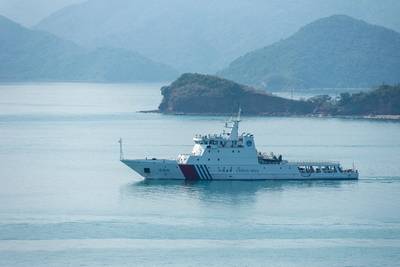China's New Coast Guard Rules 'Worrisome', Says Philippines President
Philippines President Ferdinand Marcos Jr said on Wednesday new rules outlined by China's coast guard that could result in the detention of foreigners in the South China Sea were an escalation and "worrisome".
China, which has maritime sovereignty disputes with the Philippines and other countries, issued new rules effective June 15 that would enforce a 2021 coast guard law and allow detention of foreigners suspected of trespassing.
"The new policy of threatening to detain our own citizens, that is different. That is an escalation of the situation," Marcos told reporters during a state visit to Brunei.
The Philippines "will use any point of contact with China to stop aggressive actions" and allow Filipino fishermen to fish in the South China Sea, Marcos said.
If aggressive actions are managed, Marcos said, "then we can all go about our business in a peaceful way".
China routinely accuses vessels of trespassing in areas of the South China Sea that fall inside the exclusive economic zones of its neighbors and has clashed repeatedly with the Philippines in the past year.
The rules aim to standardise law enforcement and better uphold maritime order, China's Ministry of Foreign Affairs said on Wednesday.
"There is no need for any individual or entity to worry as long as there is no illegal behaviour," Chinese foreign ministry spokesperson Mao Ning said in a regular press conference.
It was the Philippines' side "that frequently provokes the escalation of the situation" in the South China Sea, Mao said, adding that the door to dialogue was open.
Marcos has taken a tougher line than his predecessor over China's actions in the South China Sea, emboldened by support from defence ally the United States, as well as Japan and Australia.
Beijing claims jurisdiction over much of the South China Sea, a conduit for more than $3 trillion in annual ship-borne trade.
In 2016, an international arbitral tribunal said China's vast claims had no basis under international law, a decision Beijing has rejected. China insists historic records and old maps make clear it has sovereignty over most of the sea and many islands there.
(Reuters - Reporting by Neil Jerome Morales and Mikhail Flores; Additional Reporting by Liz Lee; Editing by Martin Petty and Bernadette Baum)











